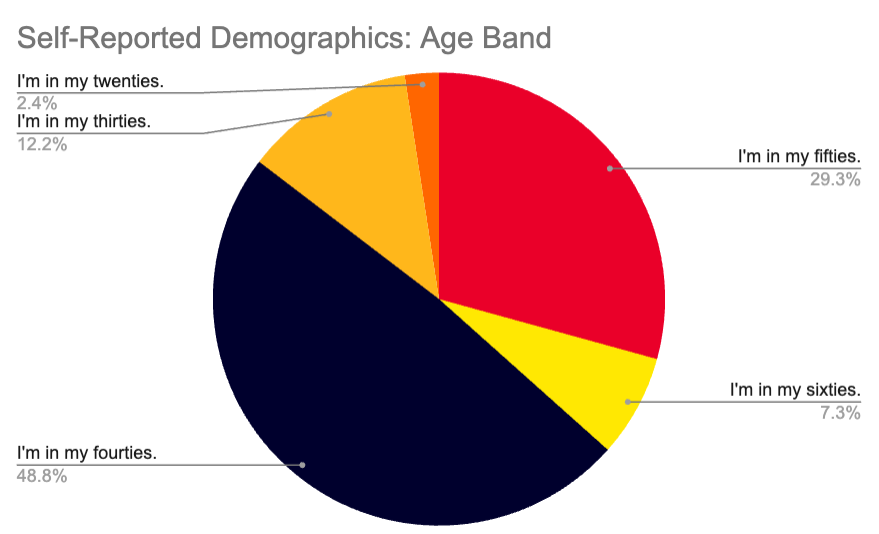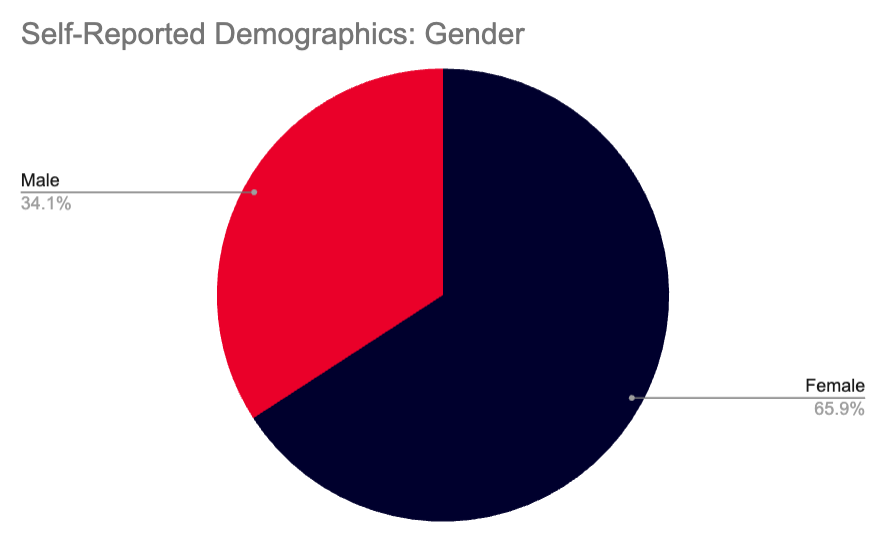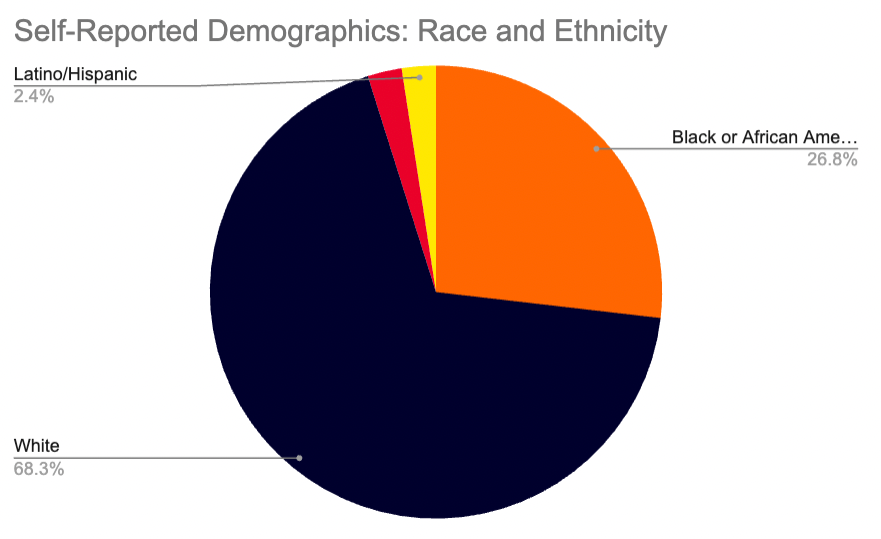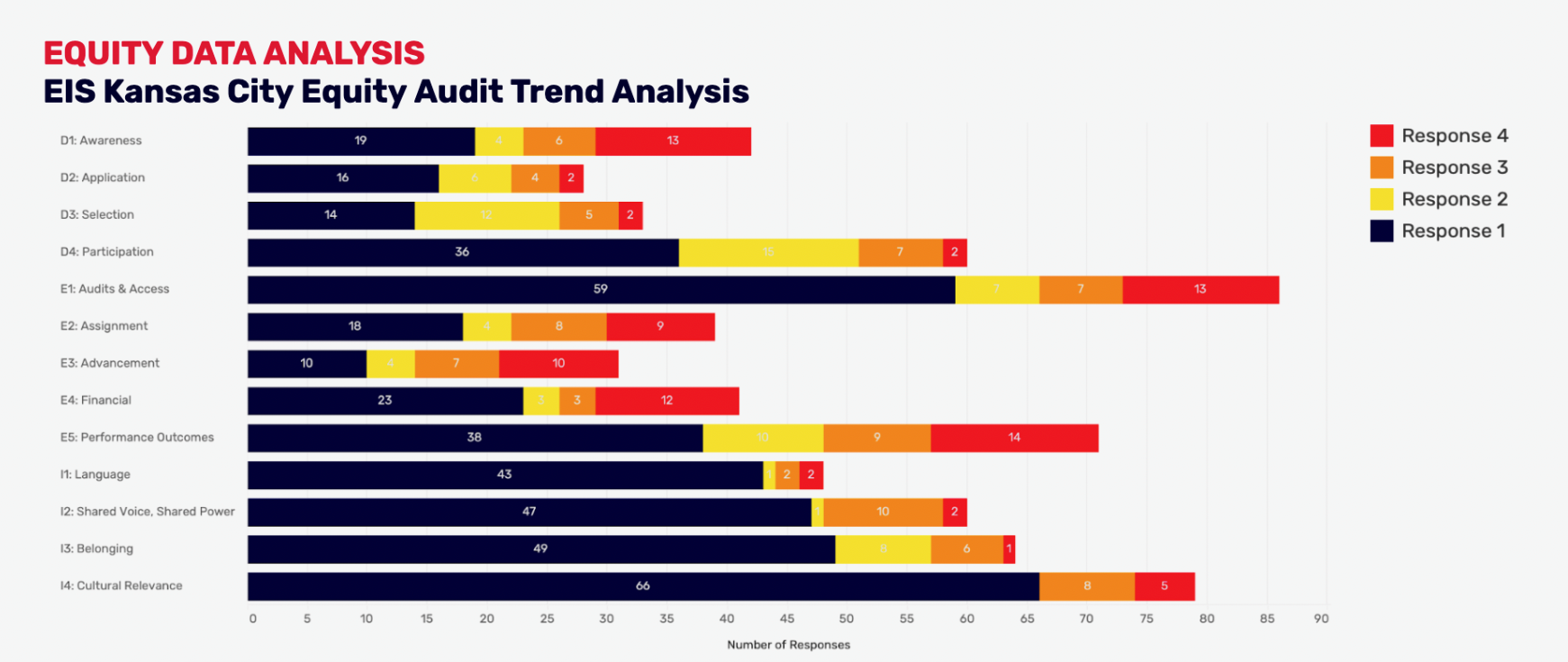What We Learned: Kansas City Equity in Schools Cohort 2
After the success of our first equity in schools Kansas City cohort, and in partnership with the Ewing Marion Kauffman Foundation, Beloved Community launched our second Equity in Schools (EIS) Kansas City Cohort in July of 2021. We were joined by four participating organizations, 3 large districts Center Schools, Piper Schools, Hickman Mills, and 1 independent school, Pembroke Hill.
Our second EIS Kansas City Cohort was a small but mighty group. The organizations were able to create instant connections and networks with their cohort-mates. Below, our Associate Director of Equity in Schools, Alisha Keig (she/her/hers) shares some data and learnings from our Equity in Schools Kansas City cohort.
COHORT DEMOGRAPHICS
In total, thirty-five school and district leaders participated in the cohort. Each school and district was asked to craft a team of seven to nine decision makers from their organization. Cohort members included assistant superintendents, principals, chief financial officers, deans, directors of human resources, directors of instructional materials and curriculum, and teachers.
Cohort members were asked to fill out a pre-survey which included self-reporting their own demographic data.



Beloved Community’s Equity Audit is built upon three standards of Diversity, Equity and Inclusion, and thirteen discreet sub-standards. Participants answer questions for each standard and substandard that apply to the organization for a group of stakeholders groups. For the education sector these groups include: Students, Parents/Guardians, Community Partners, Faculty/Staff, Admin, Board of Directors, Vendors/Subcontractors, Employee Assistance Grants, Scholarships, and Institutional Advancement.
Responses indicated that our EIS Kansas City Cohort struggled the most with Inclusion practices across all four sub-standards: Language (I1), Shared Voice and Power (I2), Belonging (I3), and Cultural Relevance (I4). Based on their responses, the organizations do not have data tools or practices in place to track how their shared interest partners are experiencing their organizations in terms of decision making, feeling like respected, valued members, and in receiving culturally relevant information, communication and celebrations.
“Beloved is unwavering in its belief that white supremacy culture is dangerous and must be dismantled.”
EIS KANSAS CITY EQUITY WORK PLAN TRENDS
After completing the content sessions, the organizations were tasked with drafting their three-year Equity Work Plans. Organizations were guided through the following process to operationalize DEI practices: define 3-5 foundational priorities, link those priorities to progress metrics or goals, connect goals to research-based strategies and key actions learned from the cohort, and finally attach data practices and metrics to those components for accountability. Beloved coaches conducted six of eight equity work plan feedback calls and received six draft plans.
According to those plans, Kansas City cohort 2 will focus on advancing equity in the following areas:
100% of organizations created a priority and goal specific to belonging for adults and students. Some of the strategies cohort participants will implement at their organizations include: gathering baseline data from belonging surveys, developing processes for assessing shared voice and power for students and staff, creating formal student groups that provide feedback on decisions, and providing professional development centered on belonging practices and social emotional learning.
50% of organizations created a priority and goal specific to increasing diverse staff. Some of the strategies cohort participants will implement at their organizations include: researching unique recruiting outlets, creating incentives to attract diverse candidates, shifting interview questions and rubric to include cultural competence, polling current educators of color about their experiences and how to improve, changing language in job descriptions to include culturally relevant terms, and creating new onboarding programming.
50% of organizations created a priority and goal specific to increasing family engagement for marginalized identities. Some of the strategies cohort participants will implement at their organizations include: conducting an annual family survey, increasing the quantity and variation of family-oriented events, providing professional development to educators about family engagement, tracking parent attendance at and participation during meetings, and auditing the diversity of parents and family members who serve in leadership roles.
Organizational leaders responded to prompts to expand on how which sessions prompted their choice of interventions:
Belonging for Students: “We discussed with our teams how to accurately get staff feedback on belongingness and inclusion and what we will do with the data so it is actually used and beneficial to the district instead of just taken and not used.”
Belonging for Adults: “I and a queer co-worker had JUST BEEN othered by one of my co-Beloved members in a VERY aggressive manner that same week, if not just a few days prior. That session felt beyond cathartic and gave me scholarly, data-based reasoning to support my feelings -- feelings that I'd just expressed in the workplace. I felt validated and it really drove home the importance and relevance of this work. As folx say in church, "it was on time!"
BELOVED LEARNINGS
Our Beloved facilitators and project manager reflected on some learnings from this cohort:
Named Leader Mindset Matters.
Originally, Beloved began this cohort with six organizations. Two organizations decided to terminate their participation in the cohort experience due to the lack of support and commitment from named leaders (i.e. superintendents). Beloved is unwavering in its belief that white supremacy culture is dangerous and must be dismantled. It is clear that if the named organizational leader cannot articulate that white supremacy culture has a negative effect on everything in this country, and therefore shows up in org-wide practices and procedures, then they will not be successful in this cohort experience. Additionally, this has negative consequences on the personnel at the organizations who are excited to take part in the cohort experience and increase their own individual capacity.
Equity Work Plan Success.
Beloved provided additional scaffolding for equity work planning throughout the cohort process. Some interventions included starting each session with an “Opening Share” to identify a priority and goal for each content area, hosting bonus calls specific to learning about the equity work plan process and how to craft the components, and creating a “cheat sheet” of all the tools, knowledge and skills participants learned throughout the cohort. Additionally, at the end of each content session, we were intentional about providing participants with examples for how to translate priorities to goals and goals to action steps.
Funding Fuels the Fire.
Beloved is extremely thankful for the partnership and support from the Ewing Marion Kauffman Foundation. The Kauffman Foundation is an ideal funder because they understand the importance of funding the interventions organizations identify on their equity work plans. It’s no secret that school districts across the nation are underfunded and specifically, that DEI supports typically take a back burner to funding things like curriculum and instruction. Kauffman has offered a grant proposal process for both our Kansas City 1 and 2 cohorts to continue their individual learning and capacity building, as well as, to implement the interventions from their equity work plans to help create more equitable and inclusive educational environments across the Kansas City metro.
COHORT TESTIMONIALS
“This whole process has been a blessing. I appreciate y'all and I love having you in my corner. I really do feel very alone sometimes -- in my work, in my workplace -- but talking with y'all, working with y'all, and refining the work my cohort is doing is emotionally and spiritually cathartic. It feels like a confession mixed with a therapy session.”
“I was able to self-care and receive affirmation and unconditional support from my coaches! The pacing and pre-work was also effective in my ability to read and digest information prior to discussing the information publicly.”
“[This process] was effective when the group space was authentic, honest, and safe for vulnerability to the process and new learning. I also find when I and others are able to share our individual stories related to the learning also very helpful in beginning my self reflection/interrogation in my heart space and moving to a technical head space. I need to start with my feelings (passion) and interrogating my beliefs to move into my head work (thinking and action). Beloved is providing a safe space and giving affirmation and feedback from our very knowledgeable coaches, and that is effective for me.”
EQUITY IN SCHOOLS COHORT OVERVIEW
The Beloved Community Equity in Schools Cohort Model is a nine-month intensive experience where organizations participate in four components:
1) Organization-wide Equity Audit
2) Eight Intensive Capacity-Building Content Sessions
3) Individualized Coaching
4) Drafting a three-year Equity Work Plan
You can read more about each of these components here. Interested in working with us? Check out our menu of services.


